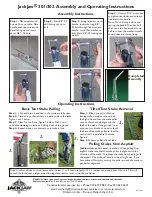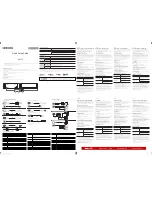
1.2 APPLICATION NOTES
The motor torque/speed characteristic of an induction motor under DC supply is similar to
the normal curve published for constant frequency, at 50 or 60 Hz, but this time having
"synchronous speed" zero RPM. This is illustrated below.
For smooth braking the DC current is typically adjusted to 300% of the motor nameplate
current. The stopping time depends on the torque setting and also the inertia of the
mechanical system.
Electric braking is not recommended for continuous or repetitive operation. The kinetic
energy of the mechanical system is transformed into heat during braking ( energy
conservation ). That heat is dissipated in the rotor of the motor.
On wound rotor motors the external rotor resistance will absorb most of the energy. On
squirrel cage motors, overheating of the motor is a real danger if frequent operation is used.
Keeping DC current on the motor stator for a short time after the motor has stopped is quite
acceptable. The heat produced by the I
2
R losses are not significant, and they are dissipated in
the stator only, not in the rotor where the rotational energy is dissipated.
PAGE 2
Summary of Contents for Cutler-Hammer TRU-START
Page 8: ...PAGE 4 ...
Page 12: ...PAGE 8 ...
Page 20: ...PAGE 16 ...
Page 21: ...5 TYPICAL CONNECTIONS 5 1 STAND ALONE DC INJECTION UNIT WITH ZERO SPEED DISABLE PAGE 17 ...
Page 22: ...5 2 TRU START STARTER WITH DC INJECTION PAGE 18 ...
Page 23: ...5 3 REVERSING TRU START STARTER WITH DC INJECTION 125 AMPS AND BELOW PAGE 19 ...
Page 24: ...5 4 REVERSING TRU START STARTER WITH DC INJECTION 200 AMPS AND ABOVE PAGE 20 ...
Page 26: ...PAGE 22 ...







































